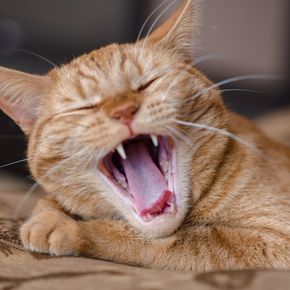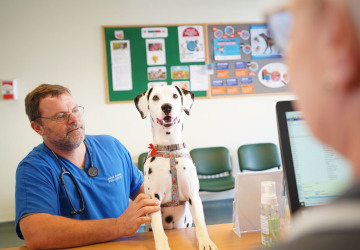
Edgewood Vets explains the signs of feline dental disease to look for
January 14, 2022
Dental disease in cats is more common than you might think, affecting around 85% of cats over the age of three according to International Cat Care. With February being Pet Dental Health Month, Edgewood Vets’ experienced team are here to help owners understand the dental problems their cat could be living with.
Contact us to book a dental check-up
Plaque & tartar – the common culprits
Head Vet, Jürgen Theinert, explains why so many cats have dental issues. Periodontal disease is typically associated with the build-up of plaque (layer of bacteria) and the formation of tartar deposits (hard yellow/brown substance) on the teeth. Left untreated, periodontal (dental) disease can develop, affecting the teeth as well as the supporting structures i.e. gums, ligaments, and bone.
Types of feline dental disease
– Gingivitis can be very painful and ranges from mild to severe; signs include red and inflamed gums, excessive drooling and bad breath, pawing at the mouth, difficulty eating, and bleeding in some cases.
– Periodontitis is severe gum disease, common in older cats with a lot of tartar deposits. Diseased ligaments begin to break down, exposing the roots and making the teeth unstable. Bacterial infection can be present and extraction is usually needed. Inflamed and receding gums are common signs.
– Stomatitis – Chronic gingivostomatitis is when inflammation spreads from the gingiva (gums) to other areas, often at the back of the mouth. It is extremely painful and cats will find it difficult to eat, probably lose weight, drool excessively, and show signs of pain such as pawing at the mouth. Some cases have been linked with persistent FCV and FIV infection.
– Feline resorptive lesions (FRLs) are erosions in the tooth in or below the gum line, commonly found in cats over five years old. Left untreated, the crown can come off leaving the root exposed.
– Fractures can be caused if the tooth is weakened and/or through eating extra hard food, engaging in rough play or hunting, or trauma.
Are some cats predisposed to dental disease?
Yes. Cats with misaligned teeth are more likely to develop dental disease; food gets trapped and can’t be cleaned effectively through diet and dental aids. Short-nosed breeds, congenital abnormalities (such as overbite/underbite), trauma, and deciduous tooth retention (when baby teeth don’t fall out and cause adult teeth to grow abnormally) are all causes of tooth misalignment. Other predisposing factors are an unsuitable diet and some infectious, preventable diseases.
How often should cats visit a Vet Dentist?
Prevention and early diagnosis are key to protecting your cat’s oral health. Prevent disease by vaccinating your cat annually, and help to prevent plaque and tartar build-ups through regular home cleaning and a suitable diet. Our Purleigh team can help you with all of this so do get in touch.
It is wise to book a 6-month check-up in between your cat’s annual vaccination & health check – a lot can change in a year and cats tend to hide pain. Checking regularly at home is a good idea too if your cat will let you. You are looking for red/swollen/bleeding gums, receding gums, excessively bad breath, tartar deposits, and missing/broken teeth.
As with all pet health concerns, we are on hand to help. Jürgen recommends booking a dental check-up and talking to one of our Vets. Our Vet Nurses can also help you master the art of caring for your cat’s teeth at home, so don’t struggle alone.






